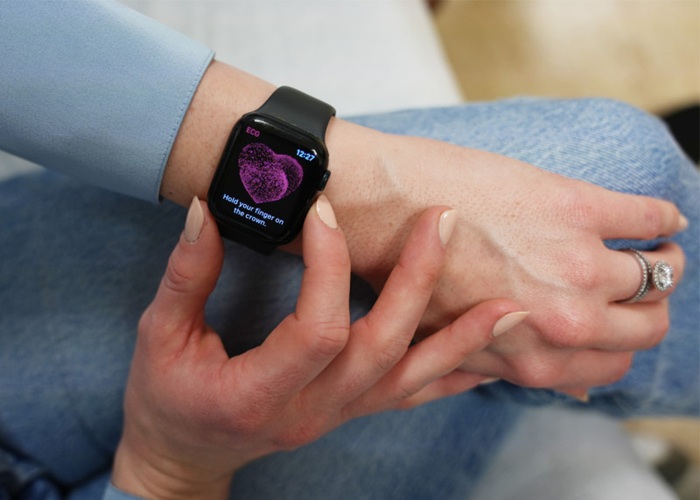Wearables Could Reduce Need for Continuous Blood Thinners in Patients with Atrial Fibrillation
|
By HospiMedica International staff writers Posted on 28 Mar 2025 |

Atrial fibrillation (AFib) is the most prevalent heart arrhythmia, affecting over 5 million individuals in the United States, with projections suggesting that number could rise to 12.1 million by 2030. This condition is characterized by rapid and irregular heartbeats originating from the upper chambers of the heart. AFib significantly increases the risk of stroke, heart failure, dementia, and early death. To prevent stroke due to blood clots, many AFib patients are prescribed long-term oral anticoagulation therapy. However, these blood-thinning medications carry their own risks, such as excessive bleeding. Balancing the risks and benefits of prolonged anticoagulation therapy can be challenging for both patients and healthcare providers. Now, a new clinical trial will examine how wearable technology can help reduce dependence on these medications in individuals with AFib.
Researchers at Northwestern Medicine Bluhm Cardiovascular Institute (Chicago, IL, USA) are collaborating with other institutions on a seven-year clinical trial that will enroll participants from over 80 sites across the US. Participants will be randomly assigned to either continue the current standard of care, which involves continuous blood thinners, or follow a new approach using the “pill-in-pocket” method, guided by a study app on the Apple Watch. This trial will also assess whether this novel approach can reduce the occurrence of major bleeding events when compared to the traditional continuous therapy. The Rhythm Evaluation for AntiCoagulaTion (REACT-AF) trial aims to monitor participants' AFib episodes and explore whether it’s possible to reduce the lifelong use of blood-thinning medications.
The trial will rely on a custom study app for the Apple Watch, which will utilize the device’s advanced heart health features to track heart activity and alert patients when they are experiencing an AFib episode. Upon receiving an alert, participants will be instructed to take blood-thinning medications for a short period, only when they are at the highest risk for stroke. To take part in the trial, individuals must have an iPhone, and Apple Watch devices will be provided to participants through a contribution from Apple. If successful, this clinical trial could pave the way for a more tailored approach to preventing strokes related to AFib.
“We know that risk of stroke is greatest in the weeks following an episode of AFib then returns to a low level, which suggests the potential for anticoagulant therapy only as needed rather than every day of the year,” said Dr. Rod Passman, MD, MSCE, the principal investigator for REACT-AF. “However, many patients have no symptoms of AFib, so treating in the moment is challenging. That’s where wearable technology comes in.”
“If we can show this ‘pill-in-pocket’ strategy is equally protective against stroke and also reduces bleeding caused by these blood thinners, that could potentially save lives, reduce cost, improve quality of life and fundamentally change the standard of care for millions of patients living with AFib,” added Dr. Passman, who for ten years has studied solutions to end the standard “one-size-fits-all” practice of prescribing lifelong blood thinners to everyone with AFib.
Related Links:
Northwestern Medicine Bluhm Cardiovascular Institute
Latest Critical Care News
- Mass Manufactured Nanoparticles to Deliver Cancer Drugs Directly to Tumors
- World’s Smallest Pacemaker Fits Inside Syringe Tip

- AI-Powered, Internet-Connected Medical Devices to Revolutionize Healthcare, Finds Study
- Starfish-Inspired Wearable Tech Enables Smarter Heart Monitoring
- AI Eye Scans Could Help Identify Heart Disease and Stroke Risk
- Digital Heart Twin Improves Diagnosis and Treatment of Cardiac Arrhythmias
- First-Of-Its-Kind AI-Powered Probability Scoring System Assesses Heart Failure with Preserved Ejection Fraction
- AI-Assisted Colonoscopy Detects More Polyps but Has Modest Effect on Cancer Risk
- AI Model Provides Real-Time Sepsis Risk Alerts for Improving ICU Patient Survival
- AI Algorithm Improves Intravenous Nutrition for Premature Babies
- Smart Mirror Generates AI-Powered Health Insights by Analyzing Facial Blood Flow
- Painless Diabetes Patch to Replace Needle Pricks

- Sensory T-Shirt Monitors Patient’s Vitals After Urological Surgery for Cancer
- Super-Sensitive Radar Technology Warns of Serious Heart Issues
- Thermal Imaging Could Accurately Track Vital Signs for Early Disease Detection
- New Microfluidic Device Improves Safety of Leukemia Treatment for Children
Channels
Surgical Techniques
view channel
New Transcatheter Valve Found Safe and Effective for Treating Aortic Regurgitation
Aortic regurgitation is a condition in which the aortic valve does not close properly, allowing blood to flow backward into the left ventricle. This results in decreased blood flow from the heart to the... Read more
Minimally Invasive Valve Repair Reduces Hospitalizations in Severe Tricuspid Regurgitation Patients
The tricuspid valve is one of the four heart valves, responsible for regulating blood flow from the right atrium (the heart's upper-right chamber) to the right ventricle (the lower-right chamber).... Read morePatient Care
view channel
Portable Biosensor Platform to Reduce Hospital-Acquired Infections
Approximately 4 million patients in the European Union acquire healthcare-associated infections (HAIs) or nosocomial infections each year, with around 37,000 deaths directly resulting from these infections,... Read moreFirst-Of-Its-Kind Portable Germicidal Light Technology Disinfects High-Touch Clinical Surfaces in Seconds
Reducing healthcare-acquired infections (HAIs) remains a pressing issue within global healthcare systems. In the United States alone, 1.7 million patients contract HAIs annually, leading to approximately... Read more
Surgical Capacity Optimization Solution Helps Hospitals Boost OR Utilization
An innovative solution has the capability to transform surgical capacity utilization by targeting the root cause of surgical block time inefficiencies. Fujitsu Limited’s (Tokyo, Japan) Surgical Capacity... Read more
Game-Changing Innovation in Surgical Instrument Sterilization Significantly Improves OR Throughput
A groundbreaking innovation enables hospitals to significantly improve instrument processing time and throughput in operating rooms (ORs) and sterile processing departments. Turbett Surgical, Inc.... Read moreHealth IT
view channel
Printable Molecule-Selective Nanoparticles Enable Mass Production of Wearable Biosensors
The future of medicine is likely to focus on the personalization of healthcare—understanding exactly what an individual requires and delivering the appropriate combination of nutrients, metabolites, and... Read more
Smartwatches Could Detect Congestive Heart Failure
Diagnosing congestive heart failure (CHF) typically requires expensive and time-consuming imaging techniques like echocardiography, also known as cardiac ultrasound. Previously, detecting CHF by analyzing... Read morePoint of Care
view channel
Handheld, Sound-Based Diagnostic System Delivers Bedside Blood Test Results in An Hour
Patients who go to a doctor for a blood test often have to contend with a needle and syringe, followed by a long wait—sometimes hours or even days—for lab results. Scientists have been working hard to... Read moreBusiness
view channel
Expanded Collaboration to Transform OR Technology Through AI and Automation
The expansion of an existing collaboration between three leading companies aims to develop artificial intelligence (AI)-driven solutions for smart operating rooms with sophisticated monitoring and automation.... Read more


















